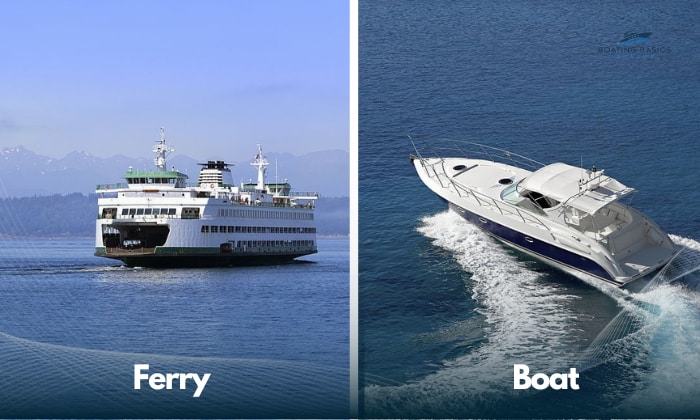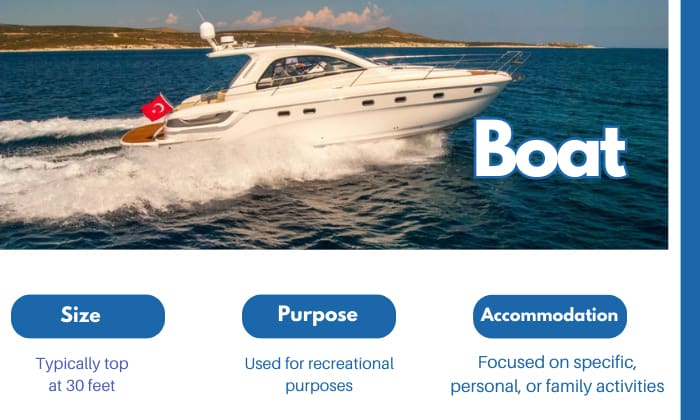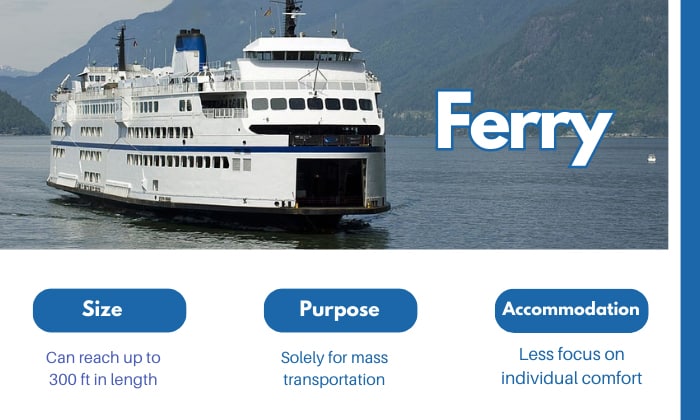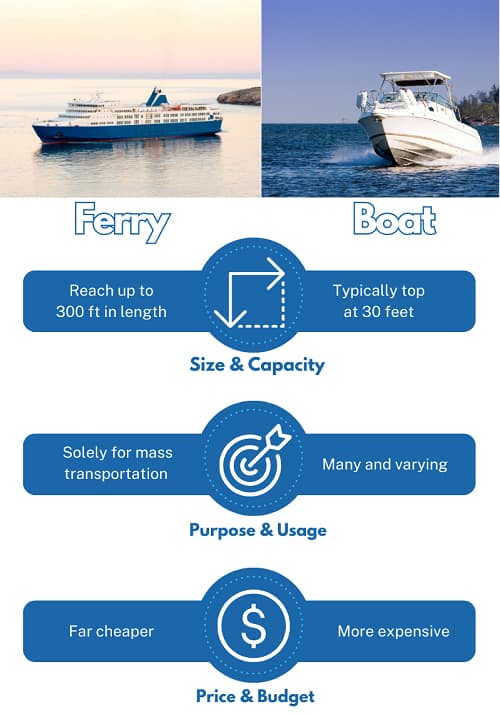More or less, we’re all familiar with the topic of boats vs. ships. On the other hand, ferry vs. boat is definitely a more unusual discussion because the two greatly overlap.
A ferry is a more specialized type of boat designed to efficiently transport passengers and vehicles between two destinations. Most run on tight schedules.
A boat is a more generalized term for a lot of small vessels that can fulfill various purposes like cruising, casual trips inshore, fishing, or personal transportation, to cite a few.
| Factor | Boat | Ferry |
| Size | Typically smaller | Larger and with a more voluminous hull |
| Purpose | Many and varying | Solely for mass transportation (e.g. from one island to another) |
| Speed | Varies based on type | Usually between 10 to 40 knots |
| Accommodation | Focused on specific, personal, or family activities | Less focus on individual comfort |
| Propulsion System | Uses different propulsion methods | Tends to be limited to engines and systems that ensure rapid operation |
| Maneuverability | Varies, but can often be easily handled by one person | Can turn quickly, maneuver efficiently, and (in some cases) handle situations autonomously |
| Docking & Loading | Mostly not optimized for rapid loading and docking | Designed for fast docking and loading, can have interchangeable bows and sterns |
It helps to arrive at an exact definition for either vessel to truly help us distinguish a boat vs. ferry. Read on to dive deeper into this topic.
Table of Contents
Overview of Boats
Given its general nature, a good definition of a boat would be that it’s a tiny (compared to ships) watercraft used for recreational purposes. Folks have boats specifically designed to make fishing, sailing, and leisurely cruising a better and more convenient experience.
Boats come in various sizes and shapes and can either be manually propelled (with oars) or motor-driven (courtesy of the engines they can integrate).
While most boats are used on inshore waters, that’s not to say that there aren’t offshore boats out there, such as the ones designed for sportfishing.
- Highly versatile for its ability to handle various recreational activities
- Best suited for fulfilling personal purposes and custom experiences (often with everyone in the family joining in)
- Comes in various sizes
- A vessel you can freely captain should you acquire the skills and license
- Generally have a smaller capacity compared to ferries
- Safety features and equipment are dependent on the owner.
- Overall safety depends on who is skippering the vessel.
Overview of Ferries
Having a larger-than-normal size (compared to boats) and the ability to transport numerous passengers and cargo at a time are but some of the definitive characteristics of ferries. They’re more similar to cruise ships in this way.
Every ferry is required to have lifeboats and life jackets, and the entire crew is responsible for ensuring the passengers’ safety for the entire voyage and should emergencies arise.
While I did say that ferries are just another type of boat, that’s not to say that they can’t be subdivided into smaller categories.
You don’t need to look further than these different types of ferries to confirm this. There are double-ended, hydrofoil, air, train, cable, and turntable ferries – all of which have their own distinct qualities.
- A more cost-effective and efficient mode of water transportation for the general public
- Safety features don’t fall in the hands of the individual boat owners.
- Operates on a strict set schedule (can be a con if you’re running late!)
- Docks and loads faster
- Limited to practical purposes
- Doesn’t cater to personal needs
Ferry or Boat: Which is Better?
All watercraft are designed to fulfill a specific purpose and fit a given situation. Whether a boat or ferry is “better” largely depends on whether the vessel will be able to suit those aspects.
Let’s use the following criteria when comparing them:
1. Size and Capacity
- Ferries can reach up to 300 feet in length.
- Boats, while there are many types available, typically top at 30 feet.
2. Purpose and Usage
- Boats are largely for personal and family outings, weekend getaways, and exploration.
- Ferries are mainly for transport, making them great for regular commuting.
3. Price and Budget
- For boats, it’s a given that your standard yacht will cost more than your average Jon boat, not to mention gas prices. In short, the budget required is never set in stone.
- For ferries, your only concern will be ticket prices, which are far cheaper.
Conclusion
The difference is stark when comparing a ferry vs. boat. What ultimately sets each one apart from the other is that ferries make it clear that they’re solely used for transporting passengers and cargo from one fixed point to another.
Boats are more fluid, precisely because it’s a general term.

“My intention from the first day establishing Boating Basics Online is to provide as much help as possible for boaters who want to experience a first safe and convenient trip. So feel free to join us and share your beautiful journeys to the sea!”




